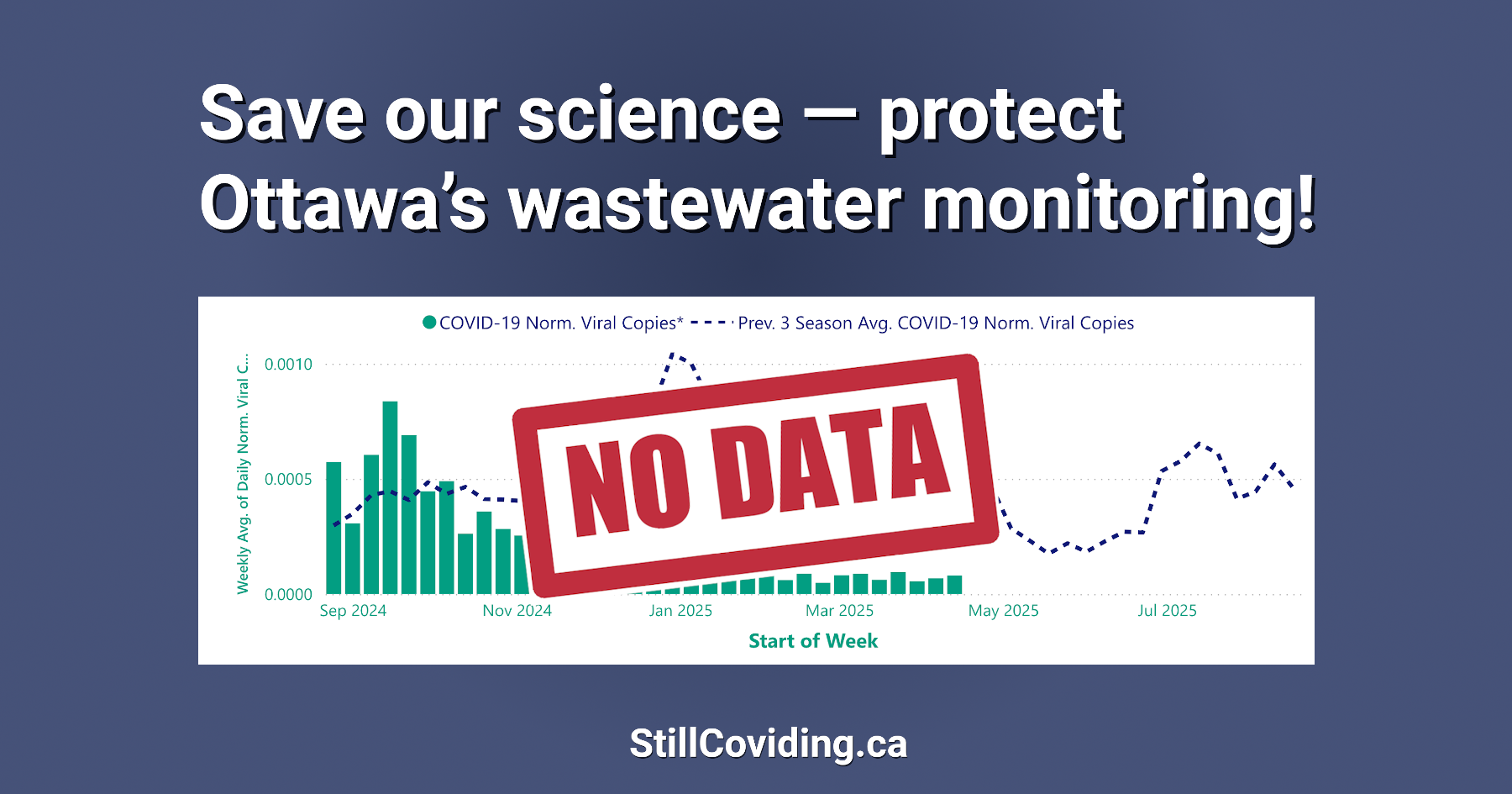I am writing to voice my support for the continuation of the City of Ottawa’s funding for our wastewater monitoring program. Ottawa’s hospitals and residents, including people with disabilities and immunocompromised people, need and expect continued access to this essential public health program. Please commit to continuing wastewater surveillance in Ottawa and extending the existing program beyond fall 2025.
Ottawa’s wastewater surveillance program is a vital early warning system for SARS-CoV-2, influenza, respiratory syncytial virus (RSV) and mpox, as well as emerging health threats such as measles and avian flu. As noted by Ottawa Public Health, wastewater surveillance is a near real-time and reliable indicator of community infectious disease transmission, and the program has received “overwhelming support” from Ottawa residents.[1] Particularly at a time when we can no longer rely on accurate health data related to outbreaks in the United States, it is important that we take responsibility for monitoring our communities for these emerging threats. Wastewater monitoring is the ideal intervention for this surveillance because of its low cost, its protection of the anonymity of residents, and its ability to rapidly detect the presence of new pathogens early on – long before cases are reported and exponential growth occurs.
At the institutional level, wastewater data supports the timely use of preventive measures to respond appropriately to health threats. For example, CHEO uses daily wastewater data to time public health interventions that keep vulnerable children out of emergency rooms, improving health outcomes and lowering costs to our already overly-burdened health care system. In Ontario, daily wastewater surveillance has enabled the optimization of public health interventions for RSV, preventing hundreds of children from being hospitalized. According to a recent analysis, wastewater monitoring allowed for accurate timing of the onset of RSV season in a dozen Ontario communities, providing savings of $2.1–$3.5 million during the first year and $13.7–$16.6 million over 1–3 years due to early RSV detection.[2][3]
At the community level, the data obtained through wastewater monitoring helps many vulnerable and informed Ottawa residents to better adapt to the varying levels of COVID-19 and the general situation regarding infectious diseases. People with disabilities, the immunocompromised, caregivers, and other equity-denied groups rely on wastewater data to time more risky activities such as medical and dental appointments, in facilities where universal masking has been dropped. Without Ottawa’s wastewater surveillance tool, we are more likely to avoid our regular routines and appointments because we are unable to appropriately assess our risk levels.
Ottawa’s wastewater surveillance is an example of a program that best epitomizes the core stated values of Ottawa Public Health of “equity”, “prevention” and “impact.” [4] We are very grateful to Robert Delatolla’s team, the City of Ottawa, CHEO and the University of Ottawa for making this public health program possible. It is important to note that there is no replacement for the high-quality near-real time data provided by Ottawa’s wastewater surveillance tool. Notably, while the Public Health Agency of Canada (PHAC) also has a wastewater surveillance program and could theoretically set up a wastewater surveillance site in Ottawa in the future, the reality is that there are significant lags in the reporting of PHAC’s wastewater surveillance data (e.g. 2–5 weeks or longer). PHAC’s tool is designed for the analysis of historical trends – not daily risk assessments. Non-real-time data would be inadequate for the risk assessment needs of Ottawa’s residents and hospitals.
Please continue your support of Ottawa residents, including people with disabilities and immunocompromised people, by sustaining this important and popular health monitoring tool. Please act now to ensure that Ottawa’s near-real time wastewater surveillance program continues beyond fall 2025 without interruption. The cost of maintaining the program will be recouped many times over by enabling hospitals and residents to reliably assess community infectious disease transmission and to prevent many infections and hospitalizations.
I look forward to your reply.
Notes:
[1] Natasha O’Neill. “Wastewater virus surveillance is coming back to Ottawa. Here’s how”. CityNews, October 4, 2024. https://ottawa.citynews.ca/2024/10/04/wastewater-virus-surveillance-coming-back-to-ottawa-heres-how/.
[2] Elizabeth Payne. “‘I was shocked’: Ontario to cancel widely used wastewater surveillance program.” Ottawa Citizen, June 4, 2024. https://ottawacitizen.com/news/local-news/ontarios-groundbreaking-wastewater-testing-program-will-be-replaced-by-a-significantly-smaller-federal-program.
[3] Elisabeth Mercier, Nisha Thampi, Shen Wan, Bosco Paes, John Fullarton, Ian Keary, Barry Rodgers-Gray, Robert Delatolla. “P-1282. Saving Lives and Costs: Respiratory Syncytial Virus Wastewater Surveillance to Guide all infant prophylaxis in Ontario, Canada”. Open Forum Infectious Diseases, Volume 12, Issue Supplement_1, February 2025, ofae631.1463, https://doi.org/10.1093/ofid/ofae631.1463.
[4] Ottawa Public Health’s Strategic Plan 2023-2027. https://www.ottawapublichealth.ca/en/public-health-services/ottawa-public-health-s-strategic-plan-2023-2027.aspx.

